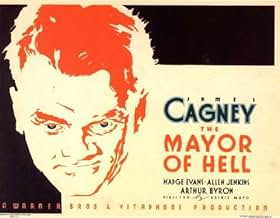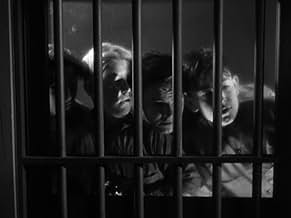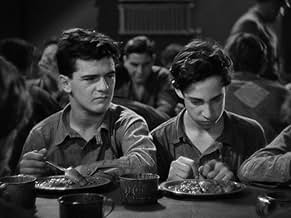ÉVALUATION IMDb
6,9/10
2 k
MA NOTE
Cinq membres d'un gang d'adolescents, dont le chef Jimmy Smith, sont envoyés au centre de réforme de l'État, présidé par l'insensible Thompson.Cinq membres d'un gang d'adolescents, dont le chef Jimmy Smith, sont envoyés au centre de réforme de l'État, présidé par l'insensible Thompson.Cinq membres d'un gang d'adolescents, dont le chef Jimmy Smith, sont envoyés au centre de réforme de l'État, présidé par l'insensible Thompson.
- Directors
- Writers
- Stars
- Prix
- 2 victoires au total
Allen 'Farina' Hoskins
- Smoke
- (as Farina)
G. Pat Collins
- Brandon
- (as George Pat Collins)
Avis en vedette
The great James Cagney, top-billed in big letters, doesn't show up till the movie's second third, and probably has less screen time than Dudley Digges, who plays the eee-vill reform-school potentate. But when Jimmy arrives, as a deputy commissioner of something-or-other out to reform reform schools, he slashes the air with his hands and jumps on the balls of his feet and spits out punchy Warners-First National dialogue with all the customary, and expected, panache. The psychology in this crisp antique, one of Warners' many efforts to assert its place as the "socially conscious" studio, doesn't run deep: Digges is bad just because the script requires him to be, and there's the quaint notion that juvenile delinquents will turn into swell kids if they're just given a dash of autonomy. But it's made in that spare, fast style that the studio specialized in, and it never bores. Frankie Darro, who got into all kinds of onscreen trouble during a brief tenure as Warners' favorite Rotten Street Kid, is an ideal JD -- a handsome, charismatic toughie with a pug nose and a hate-filled stare that could wither steel. No kid actor today can touch him.
This film worked for me where the estimable "Boys' Town" failed a few years back; true, it's a brisk-paced, openly manipulative crowd pleaser, but it's lively and gripping, with generous dollops of social comment, romantic comedy, melodrama, prison story, ensemble character work and even gangster action all thrown into the mix. Warner Brothers did have a social conscience, as Hollywood studios went (it didn't extend to their own employees, for example), but they certainly also knew how to play up the exploitation angle for entertainment. Perhaps the film's best moments are at its most cynical - Allen Jenkins shines as the lugubrious 'Uncle' Mike, the hard-bitten sidekick who has to put up with his boss's mercurial gyrations, and it's always entertaining to watch James Cagney go a little too far and get his face slapped by a dame who gives as good as she gets.
The child actors are all very good, and nicely differentiated in the vast mix of boys, and there is attention to background detail throughout - not everything is spelt out explicitly in the dialogue, for all the film's efficient hustle. There is a bit of almost everything from heartbreak (the scene with the clinging mother in the courtroom is unexpectedly effective) to horror, with a healthy spice of humour on the side; the studio roster of character actors fills out the single-scene minor roles with talent, and all in all it's a fine film in ninety minutes.
The child actors are all very good, and nicely differentiated in the vast mix of boys, and there is attention to background detail throughout - not everything is spelt out explicitly in the dialogue, for all the film's efficient hustle. There is a bit of almost everything from heartbreak (the scene with the clinging mother in the courtroom is unexpectedly effective) to horror, with a healthy spice of humour on the side; the studio roster of character actors fills out the single-scene minor roles with talent, and all in all it's a fine film in ninety minutes.
Mayor of Hell, The (1933)
*** (out of 4)
James Cagney plays a crime boss who uses his power to get a "real" job working in a boys reformatory school. At first he doesn't take the job too serious but then he sees how the boys are mistreated so he takes over running the school and tries to turn it into something good. This film was remade twice in the next six years with Crime School and Hell's Kitchen and while both of those films were very entertaining there's no question this is the best of the three versions. One thing that helps is the fact that this one was made before the code came into play so it has a lot more of a raw feel to it whereas the remakes were toned down in content. Another added bonus is seeing Cagney who once again delivers a strong performance. He doesn't show up until the twenty-five minute mark and it speaks well of the young actors who hold the film up before the star gets on screen. The supporting players all do fine work with Madge Evans as the love interest, Allen Jenkins as Cagney's sidekick and Dudley Digges as the bad guy running the school. I think one fatal flaw is the ending and the aftermath. The ending turns into a Frankenstein type setting, which might have worked but the aftermath is so rushed and faked that it really ends the film on a sour note. Outside of that this is a pretty good drama with its heart in the right place and the toughness you'd expect from a Warner/Cagney film.
*** (out of 4)
James Cagney plays a crime boss who uses his power to get a "real" job working in a boys reformatory school. At first he doesn't take the job too serious but then he sees how the boys are mistreated so he takes over running the school and tries to turn it into something good. This film was remade twice in the next six years with Crime School and Hell's Kitchen and while both of those films were very entertaining there's no question this is the best of the three versions. One thing that helps is the fact that this one was made before the code came into play so it has a lot more of a raw feel to it whereas the remakes were toned down in content. Another added bonus is seeing Cagney who once again delivers a strong performance. He doesn't show up until the twenty-five minute mark and it speaks well of the young actors who hold the film up before the star gets on screen. The supporting players all do fine work with Madge Evans as the love interest, Allen Jenkins as Cagney's sidekick and Dudley Digges as the bad guy running the school. I think one fatal flaw is the ending and the aftermath. The ending turns into a Frankenstein type setting, which might have worked but the aftermath is so rushed and faked that it really ends the film on a sour note. Outside of that this is a pretty good drama with its heart in the right place and the toughness you'd expect from a Warner/Cagney film.
Five years before the film Dead End hit theaters, this film was produced. This was definitely a film that tried to show what reformatories were really like. In most cases, the kids who were sent there didn't become reformed, they only came out harder and moved on to bigger crimes. James Cagney is great in this early role as Patsy, the racketeer who tries to keep the kids from making some of the same mistakes that he did by making conditions better for the boys in the camp. Dudley Digges played the perfect villain in Thompson, the warden of the school. He pretty much showed how when the odds were against Thompson and his cronies that he was nothing more than a coward. Also Allen Jenkins, who ironically would appear a few years later in the aforementioned Dead End, provided a lot of the humor as Patsy's stooge "Uncle Mike". Too bad this little gem is rarely shown on television anymore or that it is currently not out on DVD.
This one of those social dramas that WB knew how to put together and were guaranteed boxoffice hits in the thirties. This early "dead end kids" are sent to a reform school where they are mistreated. Cagney, a gangster as part of a deal is appointed as the commissioner of the school. He doesn't take it seriously at first but he changes and makes the necessary changes to improve the lives of the boys. The idea is to let the boys rule and administer their community. Whether this is sound social reform is beyond my belief but it's a movie. It's a lot like Boys Town with a slight darker tone. A useless happy ending deluges what impact the scene prior hard but is still good. WB would later make this same movies with Bogart in the Cagney/fatherly role.
Le saviez-vous
- AnecdotesPatsy is described as a "ward heeler" which is a political operative for a party during an election, mostly involved in vote canvassing. This means Patsy worked to deliver votes from his ward to a particular political machine that was willing to reward him for it.
- GaffesWhen Dorothy goes into her office and locks Patsy out, there is a table outside the door on which four books are resting. In the next shot, a closeup of the table top, there are only two books.
- Citations
Lawyer: Tell us what you know, I said! Never mind what you think!
Mr. Hemingway: Excuse me, boss. I ain't no lawyer. I can't talk without thinkin'.
Meilleurs choix
Connectez-vous pour évaluer et surveiller les recommandations personnalisées
- How long is The Mayor of Hell?Propulsé par Alexa
Détails
- Date de sortie
- Pays d’origine
- Langues
- Aussi connu sous le nom de
- The Mayor of Hell
- Lieux de tournage
- société de production
- Consultez plus de crédits d'entreprise sur IMDbPro
Box-office
- Budget
- 229 000 $ US (estimation)
- Durée1 heure 30 minutes
- Couleur
- Mixage
- Rapport de forme
- 1.37 : 1
Contribuer à cette page
Suggérer une modification ou ajouter du contenu manquant

Lacune principale
By what name was Le Bataillon des sans-amour (1933) officially released in India in English?
Répondre
























